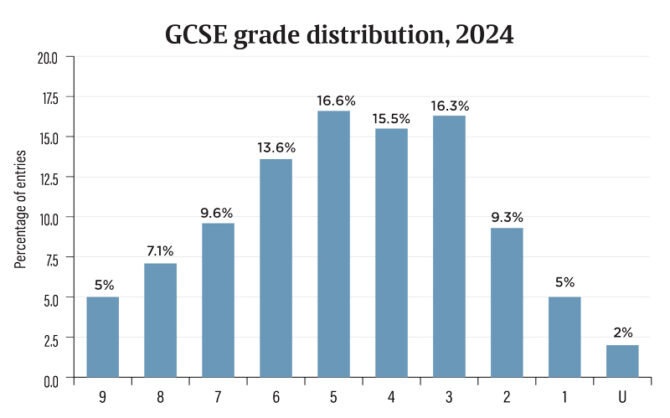Our assessment model is rough on the self-esteem of many young people. This is particularly true of the impact of the monolithic 16+ GCSE system that now defines achievement in school.
Local newspapers like to show the ‘celebrations’ of high achievers, but the rest – a goodly proportion of the population, many of whom have worked hard at school – slide away unnoticed.
That’s because it is essentially a normative process. It ranks sixteen-year-olds from the highest to lowest and distributes results along a statistical bell curve. The figure below shows the overall grade distribution for the 2024 GCSE results.

The examination boards might talk the language of ‘criteria’; they say they design assessments that show what students can do. The truth, however, is that the system ranks one student against another. Remember the fuss during Covid when teachers gave grades more optimistic than the bell curve permits?
The secondary school curriculum is structured around this normative process. Essentially, most subjects are taught in a sequence that prepares a minority to obtain higher GCSE and A level grades. The lower grades of many are the bedrock of success for a few.
I believe that the increasing problems of attendance, and some mental health issues, are directly associated with the lack of reward and lack of success experienced by so many young people.
What’s more, thousands of students who worked hard in primary school begin to switch off at the realisation of their ranking in the system. They learn about this early in their secondary career. My grandson, for example, has been talking GCSE grades since he started year 7.
We can free lower secondary from its normative shackles
And this has consequences later in life. Our system of technical and vocational education is challenged by the insecurity that so many bring to post-school learning.
Sadly, many policy makers are unaware of the statistical basis of GCSE grading. I remember one secretary of state saying that he wished he had understood the consequences of the bell curve when he came into office.
I was fortunate, in the early years of the century, to work as an advisor with Sir Tim Brighouse and Sir Jon Coles to improve the performance of London secondary schools.
Essentially this meant improving GCSE results. We achieved this to some acclaim. But we also knew that, statistically, grades somewhere else would suffer.
Of course, our attachment to the bell curve has historical lineage. This was the statistical basis of the IQ testing used to justify the grammar school/secondary modern divide.
So what should we do? All the commissions and enquiries on secondary schools this century have said we need a 14-18 curriculum. Such a structure would allow overlapping but differentiated routes to a common qualification.
In turn, this would allow many to spend part of the week on technical and vocational studies while others might choose a more academic programme.
This is the model in many other countries. In France, for example, ‘Le Bac’ is taken by most secondary students and offers both academic and professional pathways. Elements of GCSE could be incorporated into such a structure.
The huge (more than £1 billion) cost of GCSE would then be available to use in a different way. Did you know we spend more on exam entries than we do on the resources to teach the subjects?
We would also be able to return the whole term we currently lose to administering GCSE to teaching and learning.
The other great advantage is that it would free the lower secondary curriculum from its normative shackles and permit a more criteria-based approach.
The Royal Society has argued for a core mathematics curriculum that everyone should know and understand. When I taught French, I used to wonder why we couldn’t just focus on everyone speaking French for the first year. Less would mean more in so many subjects.
School is a dull experience for too many. A more flexible lower secondary curriculum and a more differentiated 14-18 offer would go a long way to solving that – and I guarantee it would raise standards.
This article is the tenth in a series of sector-led, experience-informed recommendations for the Francis review of curriculum and assessment. Read them all here












Your thoughts